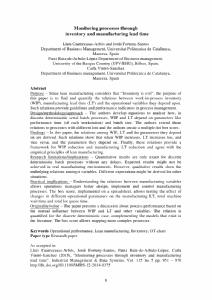Mostra el registre d'ítem simple
Monitoring processes through inventory and manufacturing lead time
| dc.contributor.author | Cuatrecasas Arbós, Lluís |
| dc.contributor.author | Fortuny Santos, Jordi |
| dc.contributor.author | Ruiz-de-Arbulo López, Patxi |
| dc.contributor.author | Vintró Sánchez, Carla |
| dc.contributor.other | Universitat Politècnica de Catalunya. Departament d'Organització d'Empreses |
| dc.date.accessioned | 2015-06-12T15:11:54Z |
| dc.date.available | 2015-06-12T15:11:54Z |
| dc.date.created | 2015-05 |
| dc.date.issued | 2015-05 |
| dc.identifier.citation | Cuatrecasas, L. [et al.]. Monitoring processes through inventory and manufacturing lead time. "Industrial management and data systems", Maig 2015, vol. 115, núm. 5, p. 951-970. |
| dc.identifier.issn | 0263-5577 |
| dc.identifier.uri | http://hdl.handle.net/2117/28296 |
| dc.description.abstract | Purpose – Since lean manufacturing considers that “Inventory is evil”, the purpose of this paper is to find and quantify the relations between work-in-process inventory (WIP), manufacturing lead time (LT) and the operational variables they depend upon. Such relations provide guidelines and performance indicators in process management. Design/methodology/approach – The authors develop equations to analyse how, in discrete deterministic serial batch processes, WIP and LT depend on parameters like performance time (of each workstation) and batch size. The authors extend those relations to processes with different lots and the authors create a multiple-lot box score. Findings – In this paper, the relations among WIP, LT and the parameters they depend on are derived. Such relations show that when WIP increases, LT increases too, and vice versa, and the parameters they depend on. Finally, these relations provide a framework for WIP reduction and manufacturing LT reduction and agree with the empirical principles of lean manufacturing. Research limitations/implications – Quantitative results are only exact for discrete deterministic batch processes without any delays. Expected results might not be achieved in real manufacturing environments. However, qualitative results show the underlying relations amongst variables. Different expressions might be derived for other situations. Practical implications – Understanding the relations between manufacturing variables allows operations managers better design, implement and control manufacturing processes. The box score, implemented on a spreadsheet, allows testing the effect of changes in different operational parameters on the manufacturing LT, total machine wait time and total lot queue time. Originality/value – The paper presents a discussion about process performance based on the mutual influence between WIP and LT and other variables. The relation is quantified for the discrete deterministic case, complementing the models that exist in the literature. The box score allows mapping more complex processes. |
| dc.format.extent | 20 p. |
| dc.language.iso | eng |
| dc.subject | Àrees temàtiques de la UPC::Economia i organització d'empreses |
| dc.subject.lcsh | Lean manufacturing |
| dc.subject.lcsh | Inventories |
| dc.subject.other | Operational performance |
| dc.subject.other | Lean manufacturing |
| dc.subject.other | Inventory |
| dc.subject.other | OT-chart |
| dc.title | Monitoring processes through inventory and manufacturing lead time |
| dc.type | Article |
| dc.subject.lemac | Producció -- Direcció i administració |
| dc.subject.lemac | Inventaris |
| dc.identifier.doi | 10.1108/IMDS-12-2014-0375 |
| dc.description.peerreviewed | Peer Reviewed |
| dc.rights.access | Open Access |
| local.identifier.drac | 16268162 |
| dc.description.version | Postprint (author’s final draft) |
| local.citation.author | Cuatrecasas, L.; Fortuny-Santos, J.; Ruiz de Arbulo, P.; Vintro, C. |
| local.citation.publicationName | Industrial management and data systems |
| local.citation.volume | 115 |
| local.citation.number | 5 |
| local.citation.startingPage | 951 |
| local.citation.endingPage | 970 |
Fitxers d'aquest items
Aquest ítem apareix a les col·leccions següents
-
Articles de revista [841]


